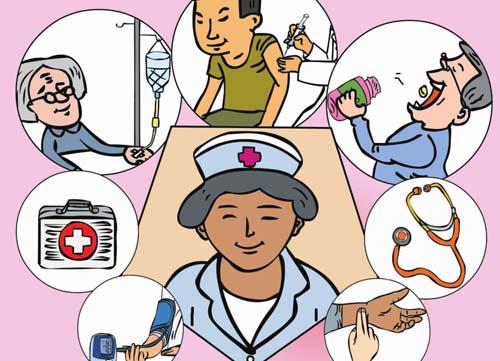Can Shared Nurses Change The Lives of the Elderly?
2018-07-02

In 1999, China passed the threshold for an ageing society, and by 2017, the countrys elderly numbered 241 million, accounting for 17.3 percent of the total population. It is predicted that by 2050, Chinas seniors will number some 487 million, constituting 34.9 percent of all the countrys people. An ever-growing demand for nursing services thus follows, which people are attempting to solve through the concept of shared nurses.
With the use of a mobile app, professional nurses will now come to homes of registered patients to offer a dozen of services including intravenous injections and aspiration.
Patients, especially the elderly and infi rm who cannot easily get to hospital, are able to access convenient and professional services via shared nurses, economical in terms of both time and money. Meanwhile nurses, whose incomes are generally low in China, seem eager to take on the extra work as these off-duty services provide an opportunity to supplement their income.
These services are thus being hailed as win-win for both patients and nurses, but some argue that as the service is linked to peoples health, there needs to be stricter standards and criteria.
Pros and cons
Jiang Debin (gansu.gscn.com.cn): Recent years have witnessed a great deal of progress in the sharing economy. Business innovations in sharing are making our lives more convenient and reshaping the way we live. Shared nurses provide many services including injections, blood tests and the changing of dressings. For patients with chronic illnesses, those who have just been discharged from hospital and the elderly, these are essential services. However, many are unable to get to hospital, so for nurses to offer the same services in their homes is a signifi cant development.
China is becoming an ageing society, and a growing number of senior citizens must now wait for care, with more than 90 percent of Chinas elderly choosing to live at home rather than in a nursing institution. Their caregivers are usually lacking in medical knowledge. Shared nurses, however, can help to solve this problem. Their professional training will bring high-quality healthcare to the elderly and they can also make extra money on the side. More and more nurses say they would be interested in such work. Current income for nurses is relatively low, and thus many of them are choosing to quit their jobs. While helping to improve their income, shared nurses can also help to relieve pressure on the countrys employment.
The nurse-sharing program optimizes the allocation of nurses by breaking down the barriers of the traditional medical industry. However, as a professional service directly related to public health, it is important to establish and improve standards, and to carefully scrutinize their qualifi cations to ensure the safety of those who receive care. Strict laws and regulations as well as guarantees of quality are the prerequisite for this emerging industry to grow and thrive.
Shen Bin (The Beijing News): So far, there have not been any accidents connected with shared nurses, and all those involved have benefited—patients have greater ac- cess to nursing services, nurses themselves make more money, online platforms take advantage of Internet Plus and O2O to expand their profi t margins. But once accidents occur, it will be hard to judge who should take responsibility. What is clear is that it will likely be the patients who suffer.
Many users support the idea, saying that it offers excellent services at a reasonable price which are unavailable at hospitals. The media have also praised it for supplementing existing nursing services.
However, this new concept also has its drawbacks. Some nurses still go to the homes of their patients to take blood, even though it is illegal to do so. Moreover, some shared nurses even give their patients whitening injections which are also prohibited by hospitals. It is reported that some shared nurses follow their patients instructions without fi rst consulting doctors.
Fundamentally, nursing is health care, unlike other services like housekeeping. Injections and intravenous drips may seem like simple procedures, but they still require expert medical skills and equipment. At normal hospitals, there are strict checks and procedures which shared nurses do not always follow, and this poses threat to patients.
From a legal perspective, providing medical services outside of medical institutions is at odds with the nursing code of conduct. As early as March 2017, the Shanghai Municipal Commission of Health and Family Planning stipulated that shared nurses are violating the rules of practice and that nurses are forbidden to provide medical services before obtaining a medical practice license fi rst.
Despite these setbacks, we cannot ignore the demand for this service. As China becomes an increasingly aged society, people over the age of 60 will increase to 255 million by 2020. For the elderly, shared nurses who visit them in the home can transform their lives. For nurses, this is a chance to further capitalize on their skills by benefi ting more people with their professional training.

Policymakers should take into consideration both the demand for nursing services in the home and medical security. In recent years, Chinas health authorities have encouraged doctors to go to different places or regions to offer treatment to patients so that medical resources can be made available to those in more remote areas. Shared nurses can also serve this purpose.
Standards to be established
Tian Yang (www.cnhubei.com): There is no denying that shared nurses can bring various benefi ts, but their rise also brings with it some problems. For example, who should be held accountable when accidents occur? What is the professional requirement for a shared nurse? To avoid the pitfalls of bike-sharing, we should set high standards for shared nurses from the outset so as to guarantee online platforms which connect shared nurses and patients are well regulated. We hope that the shared health care industry will not grow recklessly just to meet the markets demand, nor should it be killed in the cradle by overbearing regulations. Only in a balanced system can we expect the industry to develop healthily and create more benefi ts for the public.
Zhang Haiying (Beijing Youth Daily): The sharing economy is booming, not only in transport but in medicine too. Last year, the fi rst doctor-sharing platform was established in Guangzhou, capital of south Chinas Guangdong Province, and later nurse-sharing platforms began to appear too. These trends bring convenience to patients, increase the income of nurses and help to relieve the pressure on big hospitals which are always packed with patients.
Although shared nurses can help patients unable to travel for medical care, this service still has many shortcomings. Regulations and standards to guarantee the safety of nurses are still lacking, as is oversight of their medical practices. There are no regulations in place governing which patients qualify for such services and whether or not the nurses are sufficiently qualified. Many choose to steer clear of these services out of fear that nursing procedures are not standardized. For the nurses, many worry about their personal safety and so are unwilling to take on part-time work. These obstacles discourage investment in the sector and are some of the reasons why nurse-sharing lags behind similar businesses like bike- and car-sharing.
A nurse-sharing platform called Nursing at Home recently released a 10-step standard procedure on nursing services in the home, a fi rst for the sector. However, these are only standards set by a company and do not carry the same weight as official regulation.
Even though there are standards in place for sharing bikes and cars, problems still exist, and so it is better for shared nurses to be standardized as early as possible. The platforms for these services should learn from the experience of other industries which have experimented with the sharing economy, while the requirements and standards of the medical sector should be taken into full consideration.
Only a standardized and well-regulated industry can give nurses confi dence, rid patients of their concern and strengthen the courage of investors.
